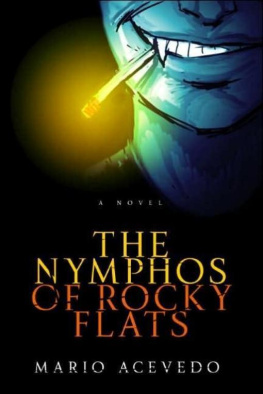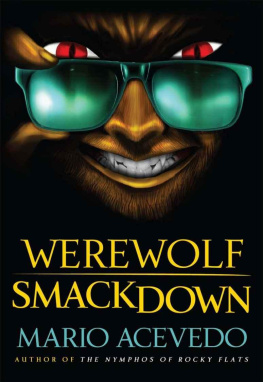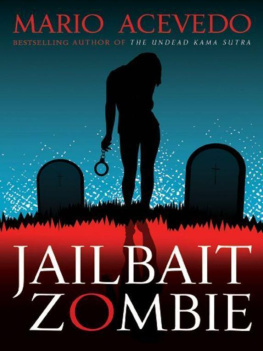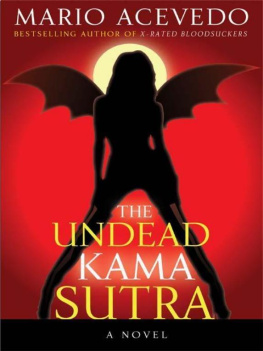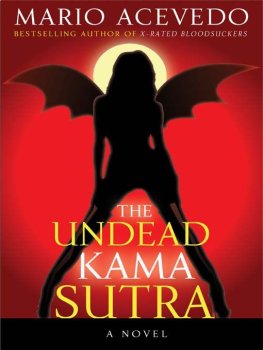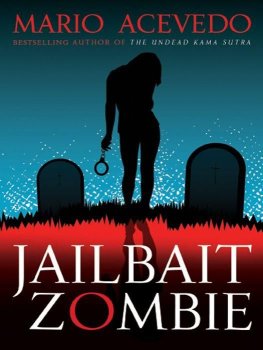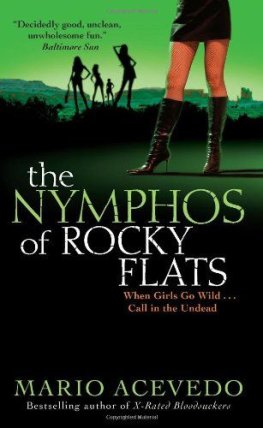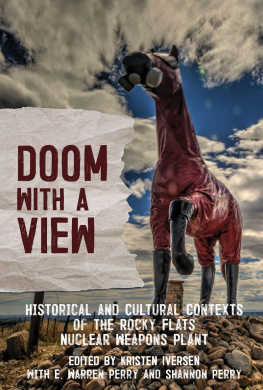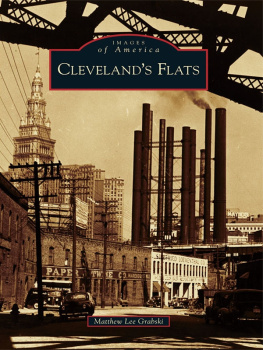Table of Contents
The Nymphos
Of Rocky Flats
Mario Acevedo
Dedication
Para mi hermana Sylvia,
por sus aos de apoyo y fe
Many thanks to Diana Gill at HarperCollins, and to her diligent assistant, Will Hinton. A special note of gratitude to my agent, Scott Hoffman of PMA Literary and Film Management, Inc. for listening to my elevator pitchwhile in an elevatorand then agreeing to give my manuscript a read. And to his colleague, Peter Miller, for his support. I couldn't have gotten this far without the wisdom and camaraderie offered by my friends in the Rocky Mountain Fiction Writers. I owe much to my fellow critique membersmany of whom have come and gone over the yearswith special thanks to Jeanne Stein, Tom and Margie Lawson, Sandy Meckstroth, Jeff Shelby, Heidi Kuhn, and Jim Cole. Mil gracias to Tanya Mote and Anthony Garca of El Centro Su Teatro for their encouragement and amistad . To my family who has always stood beside me: my Ta Anglica; siblings Sylvia (and her partner Janet), Armando; my late sister Laura; and my sons, Alex and Emil.
Chapter 1
I DON'T LIKE WHAT Operation Iraqi Freedom has done to me. I went to the war a soldier; I came back a vampire.
Two weeks after President Bush stood on the deck of the aircraft carrier Abraham Lincoln and declared "Mission Accomplished"victory over Saddam Husseinwe in the Third Infantry Division were still ass-deep in combat along the Euphrates valley. Tonight we were after fedayeen guerrillas in a village south of Karbala.
My fire team hunkered inside the troop compartment of our Bradley fighting vehicle. Dirt sifted through the open hatches above. Each of us wore forty pounds of gear like a hidearmor vest, helmet, radios, protective mask, lots and lots of ammo and grenadesunder which we marinated in a greasy funk. Days of grinding mechanized combat saddled us with a fatigue as thick as the grime caking our weary bodies.
Each of us had bloodshot eyes and was queasy from bombardments delivered danger-close. Our artillery, the air force, and the navy demolished entire city blocks while we waited across the street. Our officers joked that we were smiting the enemy with an ass-kicking of biblical proportions.
We'd get the warning, drop low, cover our ears, and open our mouths to equalize the pressure. The blasts bounced us off the ground. Our eyeballs rattled in their orbits. Dust smothered us. Concussion from the bombs would slam into my belly, and I felt like I'd gotten run over by a parade of Buicks.
A painful spasm twisted my insides. I didn't tell anyone that I had started pissing blood. If I were evacuated, who would take care of my men? It was my duty to get them out of this shit-hole alive and in one piece.
Our Bradley veered sharply to the left and right as if following a rat through a maze. The abrupt movements jostled us in the darkness of the troop compartment.
Machine-gun fire rattled along the steel-armored skirt. My jaw clenched. The worst part of war was that everyone played for keeps.
Our Bradley clanged to a stop. The turret basket swiveled to the left. The 25mm cannon answered the enemy with a comforting wham, wham, wham .
Staff Sergeant Kowtowski dropped from his seat in the turret basket. He flicked on the flashlight clipped to his armor vest and a blue-green glow illuminated my team's anxious, dirty faces. Kowtowski pulled aside the boom mike of his crewman's helmet and yelled. "Gomez, when you un-ass, lead your team to the left. There's a Humvee with the lieutenant."
"Roger," I yelled back. He could have told me this through my radio but I think he wanted to look at his men one last time in case he never saw us alive again. Softhearted bastard.
"Good luck," Kowtowski shouted and turned off the flashlight. He climbed back into his seat. The Bradley groaned forward. The turret machine gun let loose and joined the chorus of staccato blasts from the Bradleys flanking us.
I knelt against the ramp and held a strap to steady myself. Private O'Brien readied his M249 machine gun and looped the belt of ammunition over his left arm. The other men in the team crowded next to me, all of us a tight, warm ball of fear.
The Bradley halted. My shoulder banged against the hull. The ramp winched open. We ran out, our heads scrunched into the neck wells of our armor vests. My index finger reached across the trigger guard of my carbine.
Our Bradley was parked close to a long mud-brick wall, the front of a lopsided row of houses that stretched across the block. The other Bradleys from our platoon blocked the intersections before and behind us, standing guard like immense war elephants. Garbage littered the street. The night air was filmy with dust. Slivers of light escaped from shuttered windows.
We stayed behind cover, squeezing between the Bradley and a flaking plaster wall as we moved toward the Humvee.
From the top of the Humvee, the machine gunner behind an armor shield aimed a searchlight at the front door of a home. In the cone of light, the lieutenant and a gaunt Iraqi interpreter banged on the wooden door. The harsh light reduced their forms to broken silhouettes.
The interpreter twisted the doorknob and beat the door harder as he yelled frantically in Arabic. His tense voice revealed fear, not anger.
"Enough," the lieutenant shouted, "we're not here to sell Avon." He drew his pistol and pushed the interpreter aside. The lieutenant aimed his automatic at the keyhole below the doorknob.
O'Brien and I crouched beside the lieutenant like a pair of twitching junkyard dogs waiting to attack.
The lieutenant fired once. The knob flew away in a shower of splinters. He reared back and kicked the door open to the shrieks of female voices.
We sprang forward and panned the room with our weapons.
Three Iraqi women huddled like frightened birds in one corner. Their ashen faces hovered above trembling hands. They clutched black shawls to their throats. Were they a mother and her daughters? They eyed us fearfully, their gazes fixed on the night-vision goggles clipped to the front of our helmets. Rumor was the Iraqis thought the goggles gave us X-ray vision and we could see through their clothing.
A swaying electric bulb lit the room. Shadows danced across the walls. Broken furniture, loose plaster, and paper lay scattered over a threadbare carpet.
The interpreter entered and was followed by the lieutenant. Pistol in hand, he yelled at the interpreter and the women. "Why didn't you open the door? Where are your men?"
The interpreter turned to the women. When they heard his Arabic, they surrounded him, gesturing and screaming angry questions. The oldest woman gave the best performance, repeatedly pressing a hand to her forehead and swooping her other arm at the ruin in her home.
An explosion shook the house. We ducked against the closest wall. The women dropped to the floor with practiced agility. Dust trickled from the ceiling.
The lieutenant answered his radio and then hollered. "Sergeant Gomez, we got contact. Get around back ASAP."
No shit, we got contact. My team dashed into the next room, tramping over unmade beds and knocking over dressers. There was a flimsy wooden door along the back wall that I busted open.
We emerged into an alleybarren and spooky. Reaching to the front of my helmet, I flipped the night-vision goggles down over my eyes. A greenish image materialized inside the lenses, a fuzzy picture of a dark background cluttered with bright abstract shapes.
Hustling to what remained of a brick wall, I lay prone amid the rubble while my team took positions alongside.
The lieutenant whispered excitedly over the tiny earpiece of my radio. "Four, maybe six fedayeen dropped into a canal about fifty meters past the alley." He ordered me to take my men to the berm overlooking the canal while another team flushed the fedayeen toward us.
Next page
